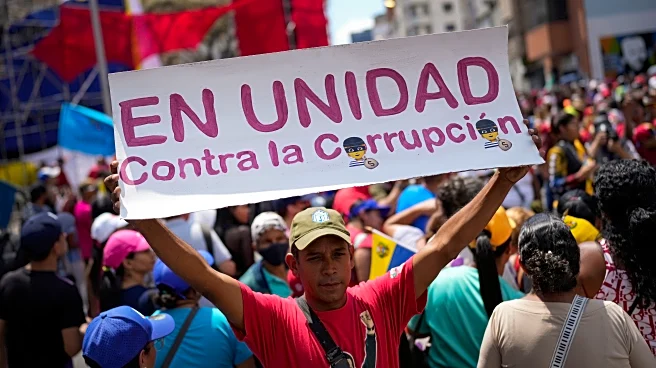What's Happening?
The U.S. has imposed sanctions on Russian energy giants Rosneft PJSC and Lukoil PJSC, causing significant concern in China's oil industry. These sanctions are part of broader measures by the U.S., EU,
and UK targeting Russian crude buyers to limit Moscow's revenue and its war efforts in Ukraine. China, which imports about 20% of its crude from Russia, faces challenges in maintaining supply while avoiding penalties. The sanctions require transactions with the two firms to be wound down by November 21, posing risks of secondary penalties such as exclusion from Western banking systems and access to dollars.
Why It's Important?
The sanctions have significant implications for global oil markets, particularly for China and India, Russia's largest customers. Companies in these countries risk losing access to discounted Russian oil, which has helped keep energy costs low. Compliance with sanctions could lead to supply disruptions and increased costs, affecting industries and consumers. Additionally, the sanctions may strain diplomatic relations between the U.S. and China, as China opposes unilateral sanctions not authorized by the UN Security Council. The situation underscores the geopolitical complexities of energy trade and the potential for economic repercussions.
What's Next?
China and India must navigate the sanctions carefully to avoid penalties while securing alternative oil supplies. This may involve increasing imports from other regions or negotiating new trade agreements. The sanctions could also prompt China to strengthen its energy independence efforts, investing in domestic production and renewable energy sources. The international community will closely monitor the situation, as any disruptions in oil supply could impact global markets. Stakeholders, including oil companies and governments, may engage in diplomatic discussions to address the challenges posed by the sanctions.
Beyond the Headlines
The sanctions highlight the ethical and legal dimensions of international trade and the use of economic measures as tools of foreign policy. They raise questions about the balance between national interests and global cooperation, particularly in addressing conflicts like the war in Ukraine. The situation also reflects the interconnectedness of global economies, where actions by one country can have far-reaching effects on others. As countries navigate these complexities, the role of international organizations in mediating disputes and promoting fair trade practices becomes increasingly important.











